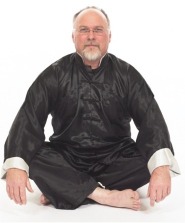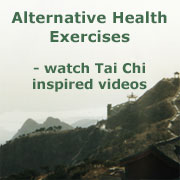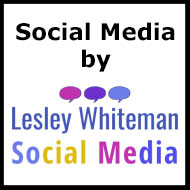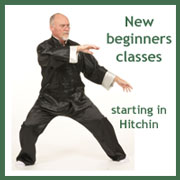
Original Chen Style Tai Chi, weekly beginners drop-in classes from January 8th 2016 at 6pm. Venue: JS Dance Academy, 1st Floor, 3 Bury Mead Road, Hitchin, Herts SG5 1RT.
I am pleased to be running a new beginners class in Hitchin for 2016 – this will be at the delightful J.S. Dance Academy studio on the edge of Bury Mead Road estate in Hitchin. This Friday class will begin on January 8th 2016 and run weekly as a drop-in from 6-7pm with a special introductory cost of £5 for January (rising to £7 in February); so if you have been considering Tai Chi or would simply like to try it, then this would be an excellent opportunity.
Contact me for further information or see here for details.

Mindfulness is receiving a lot of attention in “alternative” circles at the moment – but it is worth reflecting that it is, and has been, a vital component of spiritual meditation and of martial arts for centuries – helping us to link mind, body and spirit on a daily basis.
For example we use the practice of mindfulness throughout Tai Chi both externally and internally by calming the body and quietening the mind. This creates a meditation – a relaxed state of awareness in mind and body where our focus – our mantra – is our body moving in the world – from quiescent standing to dynamic fluidity. We use the habit of mindfulness to keep us connected and present – grounded in reality where our subconscious can work most beneficially without interruption and to achieve in Tai Chi a level of skill that we could not do with conscious intellect alone.
So how can we practice mindfulness in Tai Chi and continue the practice elsewhere?
Calming the body enables us to feel the slightest change, the smallest movement – while quietening the mind allows us to observe and notice what is going on in and around our body. We can use this internally to adjust how we move and to compare the external effect – thus we can create a feedback between our way of moving and our actions – also generally in relation to partner work where we use mindful attention to work with a partner so as to further understand how we move and how others do so – and how people move in relation to each other. We can then develop this movement to improve our balance, ease of moving and power of action – whether on our own or when in relation to others.
Mindfulness extends beyond our Tai Chi practice as we continue the principles into all aspects of daily life where we use it in physical actions and in the intellectual and emotional areas of living, working, relating, caring, loving and co-operating in positive and negative situations. Being mindful in our mind/body/spirit enables us to move from reactive to responsive and so to develop our own humanity and personal expression.
Simply Observing and Noting are vital habits of mindfulness allied to:
- Copying – (and observing and noting)
- Using repetition – (observing and noting)
- Seeking new opportunities to observe
- Replaying actions with changes – (observing and noting)
- Trying old exercises in new ways e.g. slower, faster
- Trying new exercises
- Looking carefully and deeply – observing ever smaller detail
- Looking for connections
- Looking for patterns
- Looking for discontinuities and differences
- Working co-operatively with partners
- Seeking understanding – considering one’s observations and their relationship
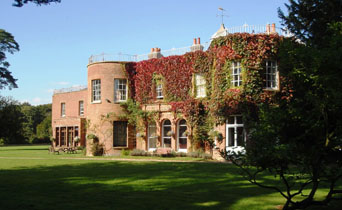
I thoroughly enjoyed hosting and teaching my first retreat for Re-Vitalise this last weekend at the wonderful St Katherines Parmoor – a full-of-character country house in Buckinghamshire with lots of space indoors and out, lovely rooms and amazing vegetarian food – I certainly had a great time and from feedback so far, so did the guests.
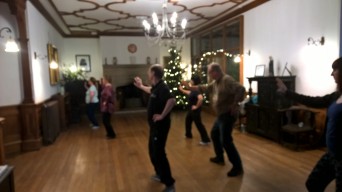 Re-Vitalise is run by the husband and wife team of Andy and Denise Spragg who have been organising successful Tai Chi and Yoga retreats for over 10 years, with many people coming back time and again – so I was mindful of the responsibility they were giving me in handing over some of their guests for the whole weekend – but I needn’t have worried they were a great group and we got on really well. A 7.30 am start is always a shock at the weekend, but despite the wind the rain stayed away so we ventured out first thing for a sensory walk in the extensive gardens so we could wake up gently and naturally followed by some Chi Kung and light movement before breakfast. Then at intervals through the day I took everyone through a relaxed introduction to Chen Style Tai Chi with some history, basic exercises, a few moves from the Laojia form and some light partner work to investigate sensitivity and balance.
Re-Vitalise is run by the husband and wife team of Andy and Denise Spragg who have been organising successful Tai Chi and Yoga retreats for over 10 years, with many people coming back time and again – so I was mindful of the responsibility they were giving me in handing over some of their guests for the whole weekend – but I needn’t have worried they were a great group and we got on really well. A 7.30 am start is always a shock at the weekend, but despite the wind the rain stayed away so we ventured out first thing for a sensory walk in the extensive gardens so we could wake up gently and naturally followed by some Chi Kung and light movement before breakfast. Then at intervals through the day I took everyone through a relaxed introduction to Chen Style Tai Chi with some history, basic exercises, a few moves from the Laojia form and some light partner work to investigate sensitivity and balance.
It was very gratifying to find that everyone “clicked” together – so we progressed smoothly through the weekend paced with short breaks and long lunches! Oh and long convivial dinners too!
Check out next year’s Re-Vitalise Tai Chi and Yoga retreats – and book early here.
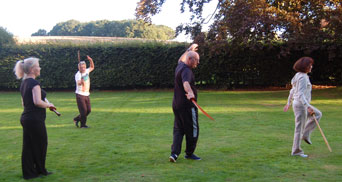
I like the “teach what they can take” approach but also see a need to give a view of what is possible.
A problem exists that where a really good teacher is available every day then the best way is one to one coupled with group work, but with UK students who have to travel long distances and do not practice so much as they might, then it becomes important that they remain 1) motivated and 2) have a way of guiding their practice in a way consistent with their teacher. I guess that ideally the student would grasp the “internal feeling” and learn quickly how to use this as a guide; many of us use our intellect to develop a model which we can then use as a guide when the teacher is not there.
I am aware that physical practice links to the emotional/spiritual and the intellectual but not everyone is open to that – this is one of those “eyes glazing over moments”
The link between health and martial arts is very important, but difficult to understand for people who are prejudiced (even in a nice way) against martial arts. It is difficult to show that the training is the same for both and that the martial background and a “does it work/absorb what is useful” approach are essential to getting the health part right – just as the health aspect is essential to developing the martial effectiveness.
Read the full article here.

Run by our friends Andy and Denise Spragg at Re-Vitalise, hosted by Ian, this Tai Chi retreat weekend is now on “Black Friday offer” at half it’s normal price – so an excellent chance to treat yourself or someone you love to a pre-Christmas present!
Normally £315 – now only £160 Full Board – book here
Starting on the Friday evening 4th Dec and running through to the Sunday 6th at around 3.00pm, Ian will deliver the retreat in his usual friendly style, striking a relaxed chord running up to this busy time of year, while he introduces you to this wonderful style of Tai Chi. Suitable for both beginners and experienced practitioners.
The retreat will be held at St Katherine’s, Parmoor, just outside Marlow in Buckinghamshire. This is a fascinating house which was once owned by the Knights Templar, it is a rural retreat centre and a unique venue set in the gorgeous Buckinghamshire Countryside.
Come along and study this amazing form in a gorgeous location. Book here.
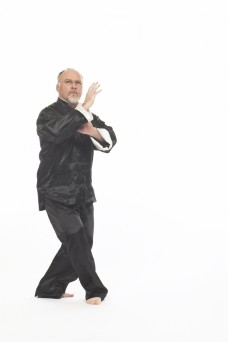
Experience has shown that Tai Chi is an effective practice for addressing the problems of falls in the elderly and others vulnerable to falls, leading to a reduction in risk in the order of 40% to 50%.
However while Tai Chi practice of itself can work well it is not necessarily suited to everyone. There are a wide range of contextual factors that need to be considered and which may improve the acceptance of a program to the participants e.g. the amount of social time and the quality of social interactions built into the class schedule. In addition it is clearly important to establish a lesson plan of Tai Chi based exercises focused on improvement of balance and mobility as well as being within the capabilities of the participants.
Read the full whitepaper here.

We are looking for more content for our Alternative Health Exercises site and would be happy to include links to suitable videos.
The site was created in response to student requests for something to remind them of the exercises they do in class but had difficulty remembering at home.
So, in an effort to help, we have put together some 15-25 minute demonstrations that students can follow along to in their own home.
If you are a teacher, or know of a teacher with a video perhaps already hosted on YouTube, then please submit your video for consideration.
At present we only cover Tai Chi inspired exercises but are looking for exercises inspired by any other recognised discipline, e.g. Yoga, Pilates etc., but the emphasis is on exercises not on routines or forms.
Appearance on the site is free and it is free to visitors. Submission is only open to copyright owners.
Please submit a link to your video(s) to Ian Deavin whose decision is final. www.alternativehealthexercises.org takes no responsibility for videos, their content or issues arising from practice of the exercises depicted in video demonstrations
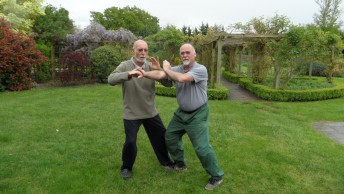
I will be holding a push hands seminar in Shefford at the Community Hall on Saturday Nov 21st at 9.30am to 12.30pm – this follows our successful seminar at the beginning of October where students asked for a repeat asap – so this is it! Cost is £30 please let me know if you will be coming.
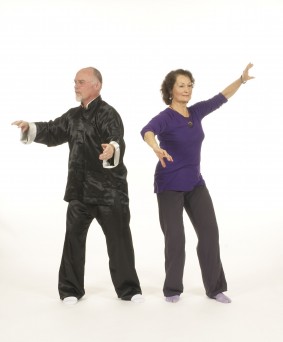
Covering exercises, spiralling movement, Qigong, meditation, Tai Chi principles and Alexander principles.
The seminar will be run by Ian Deavin and Judy Hammond and participants will be engaged in a fascinating mix of meditation and movement, creating inner body awareness and developing a practical and spiritual mind/body link of considerable strength.
Qigong is a basic training method of Tai Chi coupled with body spiralling, also found everywhere in the movement of dance and the natural world. Principles of Alexander Technique posture and relaxation aid in achieving good balance and relaxed easy movement – developed by Tai Chi practitioners into a way of creating powerful body centred action.
Venue: The Letchworth Centre for Healthy Living
Rosehill Hospital, Hitchin Road, Letchworth, Hertfordshire, SG6 3NA
Cost: £45 per seminar for bookings up to 1 week before the seminar. £55 after
To book contact The Letchworth Centre for Healthy Living on 01462 678804
For further information on the content of this seminar please contact Ian Deavin or Judy Hammond.
Please wear suitable loose clothing and flat soled trainers or similar
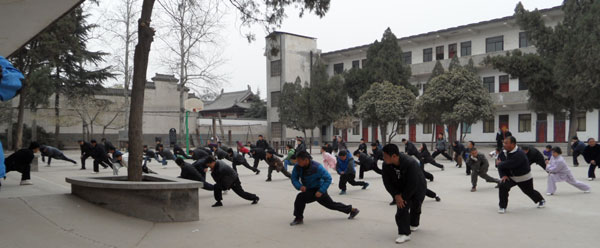
Many looking at the plethora of Tai Chi styles, forms etc. forget or may not be aware that all Tai Chi started in one place – the Chen family village at Chenjiagou in Henan Province – central China.
It was here in the early 1600s that Chen Wangting created exercises and forms which became known as Tai Chi and it was here too in the house of Chen Dehu that Yang Luchan lived while he learned Chen Style Tai Chi from Chen Chanqxing, later transposed into Yang Style and taught widely – so leading to the development of the other Tai Chi styles, including Wu, Hao and Sun styles.
I therefore seized at the chance to visit this historic place – with some romance and a sense of coming full circle from my early days of martial arts in the 1970s. The trip was organised by Patrick Wan (London) who first introduced Master Chen Xiaowang to the UK and was kind enough to extend an open invitation to accompany him to a by now annual one week international training seminar with Master Chen Xiaowang in the Chen Village Taijiquan school at Chenjiagou run by Chen Ziqiang.
See here to read more of this trip.











